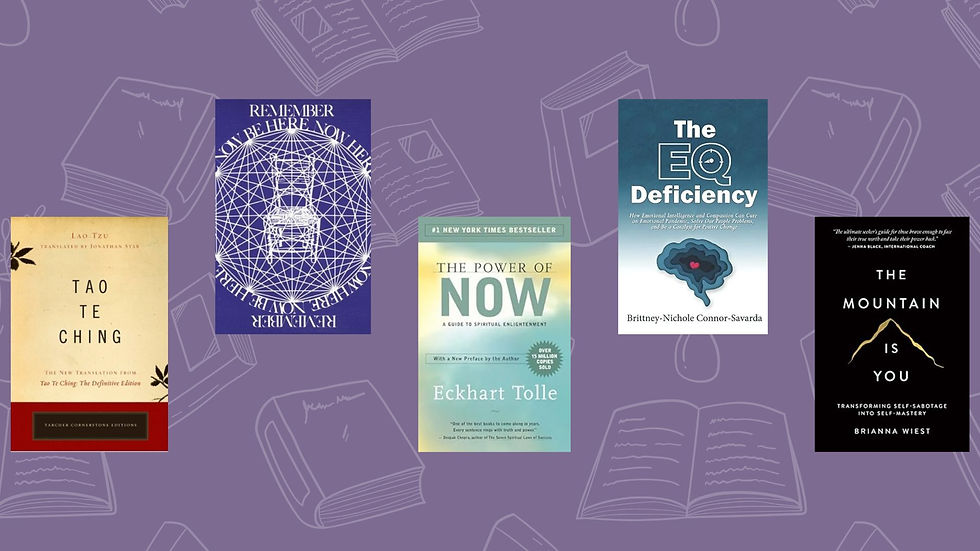The Value of Emptiness: A Counter-Intuitive and Counter-Culture Way of Living
- Brittney-Nichole Connor-Savarda
- Jul 1, 2024
- 3 min read

In the constant noise and busyness of modern life, where the unending chase for more is not only promoted but celebrated, the idea of emptiness appears strange and even unsettling, a foreign concept that challenges the core beliefs and goals deeply ingrained in our society.
Our culture celebrates the full - full schedules, full bank accounts, full shopping carts, and full social media feeds. We're conditioned to believe that emptiness equates to lack, that it's a void we must frantically rush to fill lest we be seen as failures or find ourselves consumed by existential dread.
But what if we've got it all backwards? What if the key to a life of profound contentment, clarity and inner freedom lies not in relentless accumulation, but in the gentle art of letting go?
The wisdom traditions of the East have long understood the transformative power of emptiness. In Buddhism, the concept of shunyata, often translated as emptiness or voidness, points to the fundamental nature of reality. It suggests that all phenomena - including our own sense of self - are ultimately empty of inherent, independent existence. Rather than the concrete, separate entities they appear to be, all things are deeply interconnected and constantly shifting, arising and passing away in a vast web of interdependence.
Far from a bleak nihilistic worldview, this understanding of emptiness is actually the gateway to immense freedom and peace. When we cling to the illusion of permanence and separateness, we inevitably suffer. We grasp at pleasures that cannot last, recoil from discomforts we cannot control, and struggle to shore up a sense of self that is fundamentally groundless. In doing so, we create our own inner turmoil and cut ourselves off from the limitless wellspring of contentment that resides at our core.
By cultivating a wise relationship with emptiness, we begin to unburden ourselves of the weight of all we carry. We learn to hold our possessions, roles, relationships and very identities more lightly, recognizing them as the fleeting and fluid forms they are. In doing so, we create space for a more authentic and immediate encounter with life as it unfolds moment by moment. We discover a sense of lightness, flexibility and spontaneity that is the hallmark of true freedom.
This is not to suggest a life of passionless detachment or cold indifference. On the contrary, it is the gateway to a more intimate and openhearted embrace of this precious human life in all its beauty and heartbreak. When we relinquish our desperate attempts to manipulate and control our experience, we can meet both joys and sorrows with a wholehearted presence and compassionate acceptance. We can love without clinging, give without expectation, and touch the world with a tenderness born of the recognition that there is no separation between us and all we behold.
Of course, this way of being runs counter to nearly all our cultural conditioning. It requires a kind of radical reorientation, a willingness to question our most basic assumptions about who we are and what will bring us happiness. It invites us to redefine success not in terms of what we have, but in terms of our capacity to embrace life in all its ephemerality and groundlessness.
In practical terms, this might mean simplifying our lives, letting go of excess possessions and commitments that drain our energy. It means carving out time for silence and solitude, for spacious being rather than compulsive doing. It means cultivating mindfulness and presence, so that we can show up fully for the moments of our lives without being lost in regret for the past or fantasies of the future. Most of all, it means learning to befriend the emptiness within and without, to rest in the gaps between our thoughts, to touch the stillness that is always there beneath the busyness of our minds.
This is the deeper invitation of emptiness - not a life of bland nothingness, but a vibrant, authentic and creatively alive engagement with the great mystery of existence. It is a call to let go of our futile attempts to fill ourselves from the outside in, and to discover the unshakable peace and wholeness that has always been our true nature.
In the end, maybe the greatest value of emptiness is that it is not something we need to acquire or attain, but a liberating truth to be recognized and embodied. The spaciousness we seek is not somewhere out there, but the very ground of our being. In learning to abide in that open awareness, we come home to the joy, wonder and freedom that is our birthright. And in doing so, we may just discover that a life of emptiness is the fullest life of all.



Comments